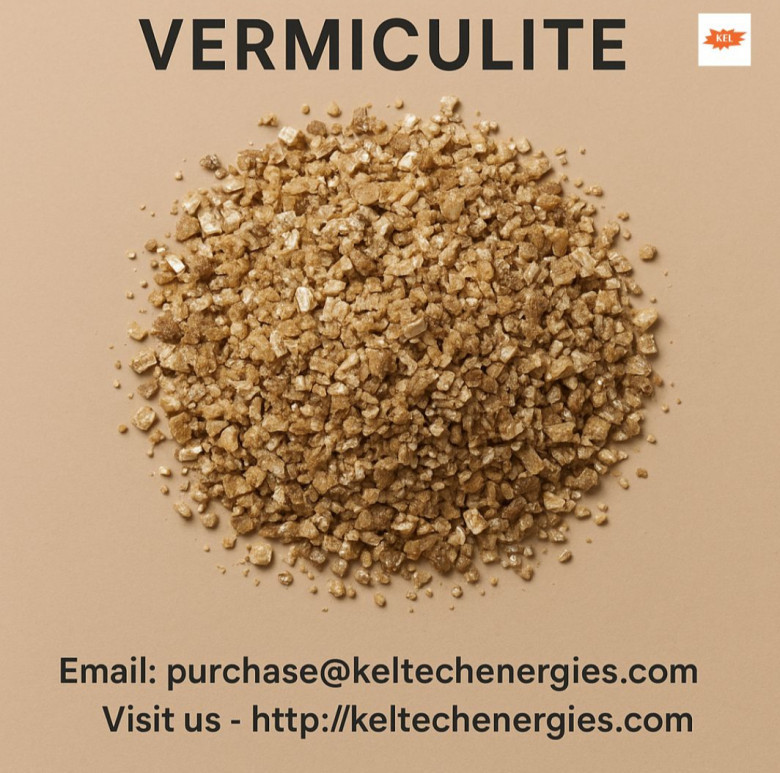views

Vermiculite is a naturally occurring mineral that has gained widespread popularity due to its unique physical properties and broad range of applications. Light, fire-resistant, absorbent, and non-toxic, vermiculite is used in industries ranging from horticulture to construction and even packaging. Its versatility makes it a valuable resource in both domestic and commercial settings.
What is Vermiculite?
Vermiculite is a hydrated magnesium-aluminum-iron silicate mineral. It is formed through the weathering and hydrothermal alteration of biotite and phlogopite. When heated to high temperatures, vermiculite undergoes exfoliation—expanding up to 30 times its original volume. This expanded form is lightweight and has high absorbency, making it ideal for many industrial and agricultural uses.
The name "vermiculite" comes from the Latin word vermiculare, meaning "to breed worms," a reference to how it expands or "worms out" when heated.
Applications of Vermiculite
1. Horticulture and Agriculture
One of the most common uses of vermiculite is in soil conditioning and plant propagation. Its ability to retain moisture, nutrients, and air makes it ideal for seed germination and root growth.
- Water Retention: Vermiculite can hold several times its weight in water, helping plants thrive even in dry conditions.
- Aeration: By improving soil aeration, vermiculite promotes root development.
- Nutrient Exchange: It acts as a slow-release mechanism for nutrients like potassium, calcium, and magnesium.
Gardeners and commercial cultivators commonly combine vermiculite with materials like peat moss, compost, or perlite to form a well-balanced and effective growing medium.
2. Construction Industry
In construction, vermiculite is valued for its insulation and fire-resistant properties. It is used in:
- Lightweight Concrete: Mixed with cement to form insulating concrete that is ideal for floors, roofs, and soundproofing.
- Fireproofing Materials: Vermiculite boards and plasters are applied to steel structures for passive fire protection.
- Plaster and Gypsum: It improves workability and thermal insulation in wall plasters.
Expanded vermiculite is also used as loose-fill insulation in attics and hollow block walls, providing both thermal and acoustic insulation.
3. Industrial Applications
Vermiculite plays a crucial role in various industrial processes:
- Packaging: Its cushioning properties make it suitable for transporting hazardous chemicals and fragile items.
- Brake Linings: Used as a lightweight, heat-resistant component in brake pads.
- Paints and Coatings: It enhances fire resistance and provides texture in decorative coatings.
4. Animal Husbandry and Pet Care
Vermiculite is also employed in reptile incubation, as it retains moisture without rotting. Poultry farmers sometimes use it in bedding to control odor and moisture.
Environmental and Health Considerations
One of the standout qualities of vermiculite is that it is chemically inert, non-toxic, and sterile when processed properly. It does not support mold or bacterial growth, making it safe for use in homes, gardens, and farms.
However, it's important to ensure that the vermiculite being used is asbestos-free. Some historical deposits were contaminated, but today, strict regulations govern mining and processing to ensure product safety.
Vermiculite vs. Perlite
While vermiculite and perlite are often used together in gardening, they serve different purposes. While vermiculite excels at retaining moisture and enhancing nutrient availability—making it perfect for plants that thrive in damp conditions—perlite is preferred for its excellent aeration and drainage capabilities.
For seed starting, a 50-50 mix of vermiculite and perlite or peat moss is commonly recommended, providing both moisture retention and air circulation.
Sourcing and Availability
Vermiculite is mined in several countries, including the USA, South Africa, China, and India. After mining, it is heated in industrial furnaces to exfoliate the raw flakes. The resulting product is graded into various sizes for different uses—fine, medium, and coarse.
In India, vermiculite is widely available through industrial suppliers and agricultural outlets. Companies such as Keltech Energies offer high-quality vermiculite tailored to different applications.
Conclusion
Whether you're a gardener looking to improve soil quality, a builder needing fire-resistant materials, or a manufacturer seeking lightweight fillers, vermiculite offers practical solutions. Its wide range of benefits—water retention, insulation, fire resistance, and eco-friendliness—make it a mineral of immense industrial importance.
As demand for sustainable and multifunctional materials grows, vermiculite continues to stand out as a reliable and versatile option. Investing in the right grade and quality of vermiculite can significantly enhance the efficiency and safety of your projects, big or small.



Comments
0 comment